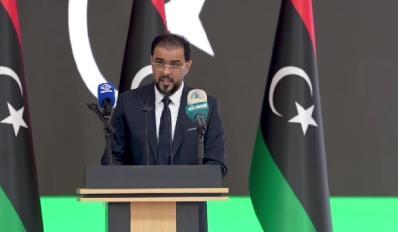The Libyan government has sent an official letter to the UN Secretary-General António Guterres, and the President and members of the Security Council, expressing its “deepest condemnation and concern” over what it described as a repeated performance by UN envoys to Libya “characterized by blatant violations of national sovereignty and unjustified interventions in internal affairs.” It considered this approach “a serious deviation from the most important tasks assigned to the mission, undermining confidence in its impartiality and credibility, and violating mutual respect.”
Direct Criticism of the Special Representative’s BriefingThe government pointed to the recent statements and briefings by Ms. Hanna Tetteh to the Security Council, describing them as “serious fallacies and blatant interventions in the internal affairs of the Libyan state and its political institutions,” and an overstepping of “the limits of the mandate granted to the mission and its supportive role for the electoral process” in a manner that “violates the UN Charter and the principle of non-interference.”
High National Elections Commission: The government accused the mission of “interfering in the commission’s affairs and attempting to impose mechanisms for forming its council according to private visions not based on any legal foundation.” It considered this a “clear violation of the effective political agreements and the independence of national institutions,” and a resort “to interpretations outside its mandate,” in “explicit violation of General Assembly Resolution 2131 (1965) concerning non-intervention in the domestic affairs of states.”
“Cultural and Linguistic Components”: It stated that the mission’s introduction of this file into its consultations “exceeds its political and technical tasks and affects the social and cultural unity of the Libyan people.” It affirmed that “Libya is a unified state with a unifying national identity that cannot be fragmented or interpreted,” and that “attempts to tamper with the national fabric are a blatant departure from diplomatic norms and an infringement on the principle of the unity and territorial integrity of states as stipulated in Article 2 of the UN Charter.” It warned that “insistence on redefining society according to categorical or cultural classifications threatens the social fabric and reproduces divisive conflicts, in violation of the principle of impartiality.”
Constitutional and Electoral Legislation: The government considered that the mission “has positioned itself as a guardian over the legislation regulating the electoral process, overstepping the jurisdiction of the legislative authority (the House of Representatives), in a clear violation of sovereignty and the principle of separation of powers,” in “contravention of Article 41 of the UN Charter, which affirms the sovereign equality of all Member States.”
Law Enforcement Agencies and the Central Bank: It criticized “discussions about arrangements and affiliations within law enforcement institutions and interference in the affairs of the Central Bank,” describing them as “internal matters that do not fall within the mission’s mandate and affect the jurisdictions of sovereign regulatory and judicial bodies.” It stressed that “the mission’s interference in the bank’s affairs and financial matters decided by national authorities” violates “the established independence of sovereign economic and financial institutions” as referenced in “relevant Security Council resolutions, particularly Resolution 2590 (2020).”
Consultation Method and the “Alternative Approach”: It stated that the mission “claimed to have conducted comprehensive consultations with all parties while it did not communicate with the Libyan government.” It considered “the reference to an alternative approach in the event of disagreement among Libyan institutions an unprecedented overreach and an unacceptable insinuation of trusteeship that threatens the national will and deviates from UN references and internationally recognized political agreements.”
The Judiciary and Laws: The letter accused the mission of having “gone too far in its transgressions, describing the work of the judiciary as politicized and ignoring respect for the laws and legislation issued by the House of Representatives.” It deemed this “a serious deviation from impartiality and a blatant interference in the affairs of the independent judiciary,” violating “the principle of judicial independence enshrined in national laws.”
References and Agreements: Sovereignty as a Condition for CooperationThe government affirmed that these approaches “contradict the spirit of the Skhirat Agreement and the UN references themselves,” which stressed “the unity, sovereignty, and independence of Libya’s institutions,” citing Security Council Resolution 2259 (2015). It also expressed “extreme dissatisfaction with the negative performance of some of the mission’s advisors,” calling on the General Secretariat to conduct “a comprehensive review of the advisory body’s composition and ensure that its personnel adhere to impartiality in accordance with Article 100 of the UN Charter.”
Principle of Reciprocity and Mission RestructuringThe government noted that its respect for international organizations is “based on the principle of reciprocity and strict adherence to legal mandates,” and rejected “any expansion of interpretations or distorted characterizations that legitimize interference in national affairs.” It reiterated that “respect for Libya’s sovereignty, unity, and unifying identity is a fundamental condition for any cooperation,” declaring its “full support for the Secretary-General’s call to restructure the United Nations Support Mission in Libya, both in its composition and its operating locations, to ensure balance among Libya’s regions, consolidate impartiality and professionalism, and restore confidence in the UN’s role as a supportive factor, not a source of conflict.”
Call for Restoring UN Discipline and Potential MeasuresThe government demanded that the mission be “returned to its professional and impartial path and respect the internationally recognized legal and institutional framework,” in a way that “enhances trust and supports national elections and the democratic process.” It concluded by “upholding the full right to take what it deems appropriate diplomatic and legal measures, in accordance with international law and the UN Charter, to protect Libya’s sovereignty and its constitutional institutions from any unsubstantiated external interference.”
